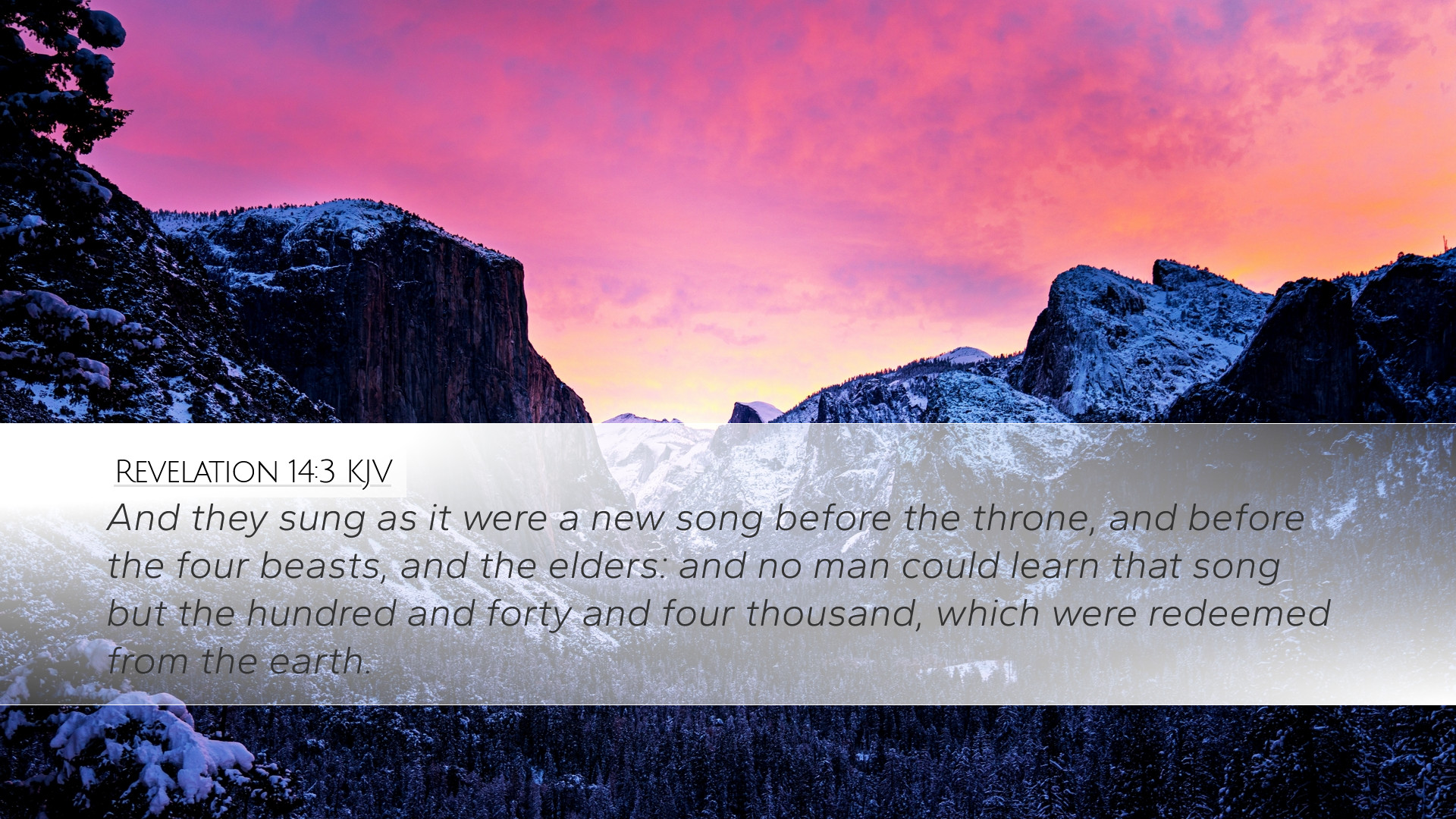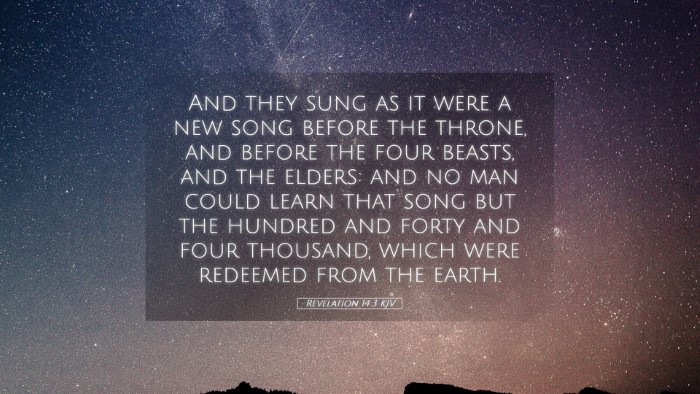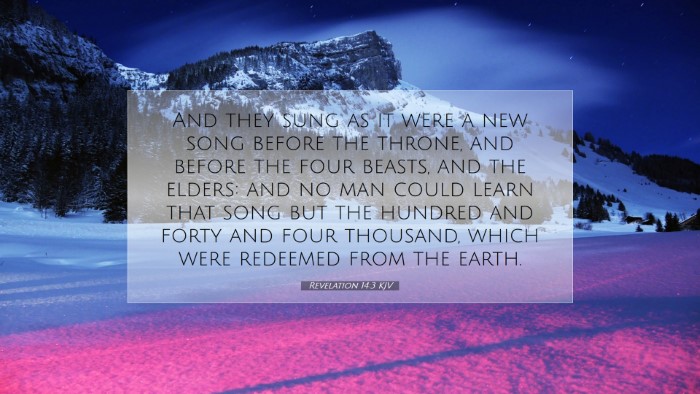Commentary on Revelation 14:3
Verse Text: "And they sung as it were a new song before the throne, and before the four beasts, and the elders: and no man could learn that song but the hundred and forty and four thousand, which were redeemed from the earth."
Introduction
The passage in Revelation 14:3 is profound and rich in theological significance. It highlights the theme of divine redemption and the distinctive nature of worship among God’s chosen people. Several public domain commentaries shed light on various aspects of this verse, including its eschatological implications, its connections to past themes in Scripture, and its relevance for contemporary believers. In this commentary, we will explore insights from Matthew Henry, Albert Barnes, and Adam Clarke, offering a comprehensive understanding of this pivotal text.
Contextual Background
Revelation, attributed to John, is a book that unveils the final challenges and the ultimate victory of Christ. Revelation 14 presents a vision of hope amidst tribulation, signifying the triumph of the faithful. This verse occurs within a larger passage that celebrates the 144,000, symbolizing the faithful remnant. The mention of "a new song" invites reflection on the nature of worship in the presence of God.
The New Song
Matthew Henry emphasizes the significance of the "new song." He interprets this song as a symbol of the new experiences of grace that believers encounter through their salvation. He notes that this is a unique melody, familiar only to those who have experienced redemption, indicating the personal and transformational nature of salvation.
Characteristics of the New Song
- Unique to the Redeemed: Henry comments that this song “can only be learned by those who are partakers of redemption.” It suggests that true worship comes from a heart that has known salvation and grace.
- Expression of Joy: This new song is an expression of the joy and gratitude of the redeemed, possessing a depth that ordinary hymns do not embody. It reflects the transformative power of God’s grace.
The 144,000
Albert Barnes provides a detailed exploration of the symbolism of the 144,000. He interprets this group not as a literal number but as a symbol of the complete number of God’s servants, representing both Jew and Gentile who have remained faithful to God's calling. Barnes notes that this select group is not merely about numerics but emphasizes the security and special status of those who are redeemed.
Spiritual Implications of the 144,000
- Identity of the Redeemed: Barnes argues that the 144,000 symbolize a broader spiritual truth about the community of believers who are called to be witnesses to the world.
- Faithfulness in Trials: The mention of the 144,000 indicates their steadfastness in the face of persecution, serving as an encouragement for believers to remain faithful amidst adversity.
Worship Before the Throne
Adam Clarke delves into the importance of worship in the heavenly context presented in this verse. He asserts that the setting of worship before the throne of God is a pivotal aspect of the Christian experience, emphasizing that worship is intrinsic to being in God’s presence. Clarke reflects on the gathering of "the four beasts" and "the elders" as a representation of all creation and the redeemed who collectively engage in worship.
Elements of Worship
- Communal Worship: Clarke notes that the gathering of various celestial beings underscores the communal aspect of worship, suggesting that all of creation participates in glorifying God.
- Divine Authority: The act of singing before the throne emphasizes the recognition of God’s sovereignty and holiness, reminding believers of their humble position as recipients of grace.
The Challenge of Learning the Song
The assertion that "no man could learn that song but the hundred and forty and four thousand" implies exclusivity in understanding and expressing the redemptive experience. This exclusivity is not meant to discourage but rather to highlight the wonderful and often personal nature of God's dealings with His people.
Theological Reflections
- Faith and Revelation: Commentators like Clarke emphasize that understanding and celebrating God’s truth is a matter of revelation and experience. The faithful are given insight that the world cannot comprehend.
- Encouragement for Believers: This verse serves as a reminder to believers that their experiences, trials, and redemptive journeys are unique and worthy of expression in worship.
Conclusion
Revelation 14:3 encapsulates profound truths about worship, redemption, and the identity of God’s people. Drawing from the commentaries of Matthew Henry, Albert Barnes, and Adam Clarke, we observe that the new song sung by the redeemed is significant in its exclusivity, joy, and the shared experience of salvation. This passage encourages contemporary believers to engage deeply in worship, recognizing its roots in genuine encounters with divine grace.
For pastors, theologians, and scholars, the study of this verse emphasizes the need to foster communities that celebrate and nurture such profound experiences of worship, echoing the praises of the faithful before the throne of God.


